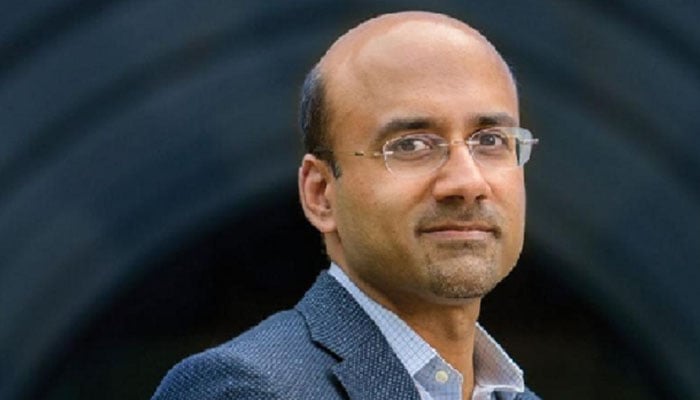Imran left economy in worse shape: US economist
US economist Mian Atif was selected by the Imran govt in its first year to serve the country.
ISLAMABAD: Pakistan’s economy is now in a worse shape on all accounts under the three-and-a-half year rule of PTI led government in 2022 than it had inherited from the PMLN led government in 2018, it has been claimed by a US economist Mian Atif, who was selected by the Imran govt in its first year to serve the country but was later dropped after a controversy.
Renowned Pakistani-American economist Atif Mian stated that the PM was voted out of office by the parliamentarians after 3.5 years; he had inherited a bad economy but leaves it Renowned Pakistani-American economist Atif Mian stated that the PM was voted out of office by the parliamentarians after 3.5 years; he had inherited a bad economy but leaves it in even a worse shape.
"The PTI tenure could be marred by low GDP growth, higher inflation, especially food inflation, average low tax collection of FBR, higher expenditures, rising public debt and liabilities as well as an escalating monster of circular debt. Now the twin deficits known as yawning fiscal deficit and current account deficit are again skyrocketing, especially the current account deficit was again touching a level that was inherited by the PTI government when it had assumed reins of power after winning the 2018 general elections."
Atif said: "There's been zero increase in average income, and Pakistan never got out of the balance of payment (BoP) crisis. The Covid gave temporary respite to BoP crisis as oil imports and domestic demand contracted due to the pandemic, but with pandemic receding, it is back in serious trouble."
He said that the larger failure was an incapacity to understand Pak macro challenges the PTI inherited, a currency crisis that was already months in motion. Yet the new govt had done no planning. Precious time and reserves were wasted with silly schemes, he added.
"When finally external adjustment was forced upon the government, it could have enacted new policies to ensure that Pak: (a) gets out of BoP trouble, (b) gets on a sustainable growth path. But even (a) never happened, (b) had no chance." He raised a question why and replied that because the government policy went for the usual shortcuts: open capital account for speculative portfolio investment, encourage unproductive real estate investment, continue to subsidize an elite-favoring rentier economy, go on foreign begging trips, etc.
"What should have been done was not done, e.g. engineering an ambitious energy-independence policy, without which Pakistan cannot have sustainable growth. This would have required pulling the best renewable energy scientists into the country and giving them discretion and resources. Instead we got the emotional appeal for a dam fund. Growth is serious business. It requires building value-chains inside your country, it requires building capacities of your people, your firms, your government. This basic sense was missing."
It is extremely unfortunate that a government that millions had pinned high hopes on has ended in such colossal failure. Atif added: "I hope those who come next learn from this, and their own past failures."
-
 Mexico’s President Considers Legal Action Over Elon Musk Cartel Remark
Mexico’s President Considers Legal Action Over Elon Musk Cartel Remark -
 Prince William Hits The Roof With The Andrew Saga Bleeding Into Earthshot
Prince William Hits The Roof With The Andrew Saga Bleeding Into Earthshot -
 HBO Gives Major Update About 'Industry' Season Five And Show's End
HBO Gives Major Update About 'Industry' Season Five And Show's End -
 Donnie Wahlberg Responds To 'Boston Blue' Backlash: 'Nobody Was More Disappointed Than Me'
Donnie Wahlberg Responds To 'Boston Blue' Backlash: 'Nobody Was More Disappointed Than Me' -
 Jennifer Garner Gets Emotional Over Humble Career Start: 'It Makes Me Want To Cry'
Jennifer Garner Gets Emotional Over Humble Career Start: 'It Makes Me Want To Cry' -
 Princess Beatrice Told An Acquaintance That She ‘likes’ Jeffrey Epstein: Grim Verdict Drops
Princess Beatrice Told An Acquaintance That She ‘likes’ Jeffrey Epstein: Grim Verdict Drops -
 Late Katherine Short's Neighbours Give Insights Into Her 'peace Loving' Personality Post Suicide
Late Katherine Short's Neighbours Give Insights Into Her 'peace Loving' Personality Post Suicide -
 Fresh Details Of King Charles, Queen Camilla's US Visit Emerge Amid Andrew Investigation
Fresh Details Of King Charles, Queen Camilla's US Visit Emerge Amid Andrew Investigation -
 Iran 'set To Buy' Chinese Carrier-killer Missiles As US Forces Gather In Region
Iran 'set To Buy' Chinese Carrier-killer Missiles As US Forces Gather In Region -
 Prince Harry And Meghan Unlikely To Meet Royals In Jordan
Prince Harry And Meghan Unlikely To Meet Royals In Jordan -
 Hero Fiennes Tiffin Shares Life-changing Advice He Received From Henry Cavill
Hero Fiennes Tiffin Shares Life-changing Advice He Received From Henry Cavill -
 Savannah Guthrie's Fans Receive Disappointing News
Savannah Guthrie's Fans Receive Disappointing News -
 Prince William Steps Out For First Solo Outing After Andrew's Arrest
Prince William Steps Out For First Solo Outing After Andrew's Arrest -
 Jake Paul Chooses Silence As Van Damme Once Again Challenges Him To Fight
Jake Paul Chooses Silence As Van Damme Once Again Challenges Him To Fight -
 Google Disrupts Chinese-linked Hacking Groups Behind Global Cyber Attacks
Google Disrupts Chinese-linked Hacking Groups Behind Global Cyber Attacks -
 Four People Killed In Stabbing Rampage At Washington Home
Four People Killed In Stabbing Rampage At Washington Home




